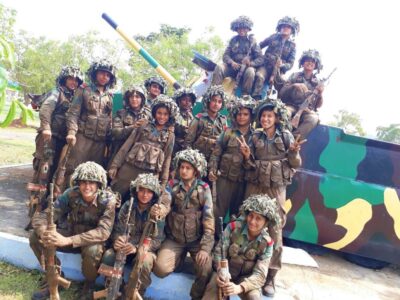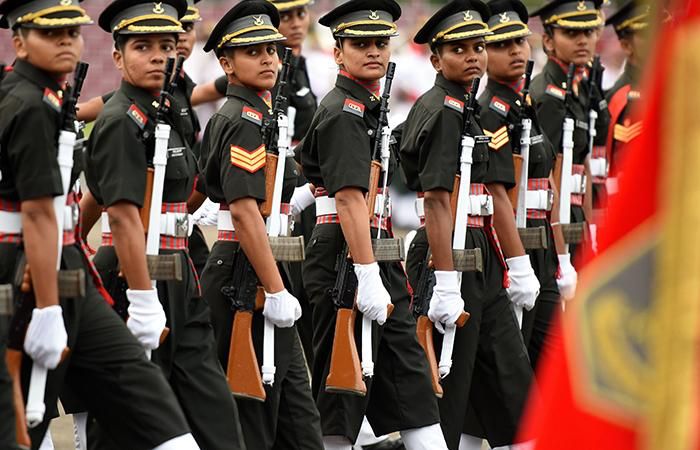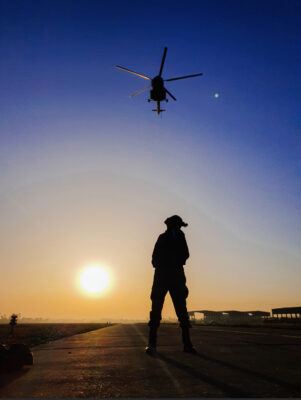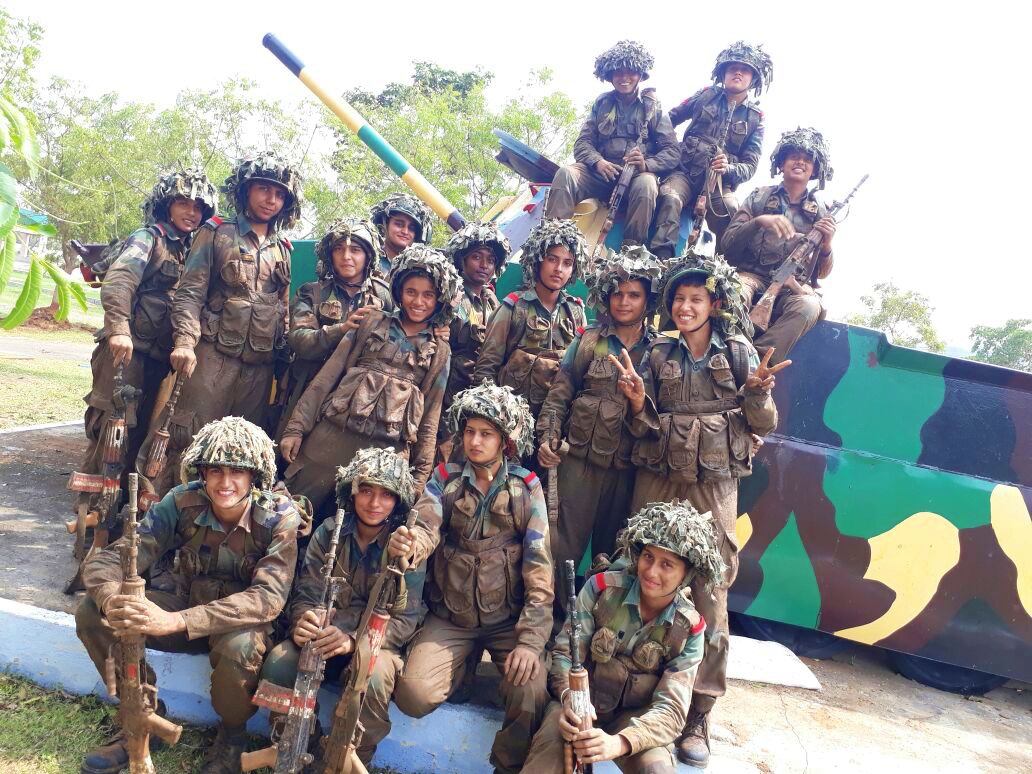
It took 45 yrs for the Indian Army to accept women in non-medical corps appointments, 73 years to give women ofcers command positions at par with their male counterparts, and 29 yrs after women officers were inducted in the armed forces, to give them permission to serve in combat roles. As expected, this decision has come with its share of misgivings and apprehensions, both from within the Army and outside, with a wide cross-section questioning the wisdom of this move. The arguments put forward by those against women in combat roles do not, largely speaking, give objective reasoning for their viewpoint and the discussion gets sidelined into a debate on patriarchy and social and cultural issues. With the main issue never getting addressed, it reinforces that women in combat roles aren’t the problem: mindsets are.
Statements like “Women don’t belong in combat arms,” are routinely heard and the arguments that are presented range from problems women and men would face if launched together in operations; the logistics of catering for separate toilets; their safety during operations, etc. This write-up will try to address these arguments in an attempt to change the prevailing mindset, and hopefully, answer those whose main problem with women in combat is ‘arranging a separate washroom’.
Women, the weaker sex?
Women in India have fought wars and also led armies into battles for centuries. What, then, caused them to take recourse to the apex court to consider their permanent commission; role in combat arms; intake into the National Defence Academy and Sainik Schools? It seems that more than the external enemies that women in uniform have to fight in the service of their nation, there are internal battles to be fought to change mindsets.
The arguments have always been circling around women being the weaker sex. The association of war, militaries and soldiers with men is considered “normal” or “natural” because of deeply rooted societal attitudes, resulting in women being equated with weakness, an excess of emotion and the need to be protected. Acceptance into the military has often been viewed as undermining the institution, thus resulting in women facing resentment, marginalisation, and discredit by their male counterparts even after close to three decades of serving in various branches of the Indian Army.
Being the ‘izzat’ (honour)
Why is the woman still considered the “izzat” (honour) of the home/country? How is the abduction of a woman officer/soldier different from a male officer/soldier being taken as a prisoner of war? The case of Lt Saurabh Kalia where he was tortured brutally before his execution makes the blood boil but also puts out a question: if a woman would have got the same treatment from the adversary, would the rage have been more? As equals, the country should feel the same rage if anything like this were to happen to any soldier, irrespective of their gender.
It is said that men are inherently protective of women and if they were to see a female colleague injured in battle, they would try to do everything to protect her. Surely, the same would be the case if any of their brothers in arms were in need of protection. Another scenario pointed out against women in combat is that of the implications for those rendering First Aid to them in case of grave injuries being sustained on private parts during battle. Needless to say, in such situations, the person attending to the wound would see it as simply a piece of flesh and blood that needs to be medically attended to, with the gender and organ being of no importance.
Physical training standards
There is a need to holistically review and evolve physical training standards, irrespective of gender. The present standards may need revision based on roles that need to be performed in combat. The solution to these problems is to create an appropriate, realistic, age and gender-neutral standard for combat arms and not ban an entire demographic group because there is a weak standard in place. A capable and competent majority of women cannot be penalised because the minority may not be up to the mark to serve in combat units. Moreover, selection processes for being allotted combat arms are already in place for male soldiers and officers. So, let merit, and not gender, be the deciding factor, both for men and women.

Toilet: Ek prem katha (a love story)
For people who view catering for separate washrooms for women during combat as the main problem, here’s a simple question: What if the army was full of women and the percentage of men was around 0.56 (currently the percentage of women in the Indian Army)? Surely then, the men would have asked for a washroom or some sort of a place to do their business. It is normal to feel that way when you are one in many. Also, a solution is always available if the intent is there, like the Female Urinary Diversion Device (FUDD), which allows you to urinate discreetly while standing up or leaning back with minimal undressing.
No more tokenism
What is not needed is a model woman officer standing behind the Prime Minister or leading a contingent on Republic Day as a portrayal of women empowerment. More than empowering the women, we need to empower the armed forces, and it begins with providing equal opportunity to women. Patriarchy should not come in the way of equality. Let it be the survival of the fittest and the best in the organization, and not only of the fittest man. Making certain changes in the fundamental framework and stricter laws will address most petty issues being used as a case against accepting women in combat roles in the military.
Calling out patriarchy
The experience of women officers has been a mix with the majority having supported, groomed, mentored and trained them ruthlessly to turn them into good officers who can lead others into battle. There have been those who have tried to pull women down because of their gender or discredited their fraternity, only to goad them to train harder to lead men in battle.
What women need is for the armed forces to view themselves as a gender-neutral profession by removing their biases. The first step is accepting change, starting with girls getting admission into Sainik Schools and then joining National Defence Academy. Initial challenges in terms of amalgamation of training curriculum, trainers, administrative arrangements, etc. are to be expected but that is a matter of detail, which can get resolved if the Army has its heart in the right place.
Changing cultural mindsets is never without headache or heartache. “Gender can’t be a basis of disqualification,” says Additional Solicitor General Aishwarya Bhati. The women agree. Let the best man/woman win.

Share
Picture Credit : Google

Very well written Mrs Nayar. Not all women wear pearls and sensible shoes, some wear dog tags and boots…
Cheers and more power to Women wearing combats…
Thanks a lot Nikhat. Agree…stereotypes have to be fought.
So very well put. As very rightly said, the problem is the mindset. It always has been with any organisation, and when it comes to the forces, more so because the men see this organisation as their birthright and the acceptance of women officers is still taking time.
The fact that we still address them as ‘women officers’ and not as ‘officers’ is a glaring example of how well they are accepted or not accepted in the organisation. We can keep debating/discussing their training standards, make an entire conversation around their capabilities, but nothing will change till the acceptance does not come from the officers. The men (read jawans/Jco’s) have had absolutely no issues. There is no doubt about their capabilities in the mind of anyone. Physical training standards can be worked/reworked upon, if the intent or will is there.
Let’s open our heart and mind and allow them to follow their passion in the best interest of the organisation/nation.
Thank you Anuradha and very well said. Change will come with acceptance, and for that patriarchal mindsets need to be addressed. A beginning has been made, and the only way forward is upwards now.
Excellent article. It brings out the real issues beautifully. Women Officers have much better Officer Like Qualities than their male counterparts if one takes out the average. But the focus will always be diverted to physical capabilities which is but one of the many qualities that make up an officer and a leader. The feudal mindset of looking at this issue needs to be done away with.
Thanks a lot Amol. We need more men who think like you and call a spade a spade. Feudal mindsets have reigned supreme for far too long in the army, and they need to be called out.
Very well written, Army should be gender neutral and gender indeed can never be the basis of disqualification.
Thank you Manvi. Absolutely, gender should never be a basis of qualification.
Rashmi, this is an issue which requires a great deal of clarity and contextuality.
You have brought out a few aspects really well and also the fact that We need a lot of work.
For army to become among the last bastions for women to be equal in all respects,a lot of work would have to be done to reset the practices and standards to make it gender neutral. It’s not about gender bias.its about diversity or shall l say neurodiversity which fosters creativity and innovation,a much needed want for any organisation to become greater than it is.
Thanks a lot Vanita. What needs to be urgently addressed are the mindsets. A great deal of time and work has already gone into making this move. The resistance coming as it does from a hierarchical and patriarchal structure of an organization like the army, is to be expected. Now the implementation must begin.
Patriarchy to be blamed.
Women face the weaker sex tag in all spheres including being a mountaineer.
I wonder if the soldiers of Razia Sultan or Rani Jhansi wondered where they peed?
Haha…love the observation about Rani Jhansi and Razia Sultan. Thank you Himani. Agree with you that the “weaker sex” tag is flaunted by patriarchal mindsets in every sphere.
Very well written Mam
Sardonically, If Capt X (male officer) makes a mistake.. it is Capt X to be blamed. If Capt Y (women officer) makes a mistake… It is entire women officer fraternity who is under question.
Secondly, it is not troops who are not ready to accept women officers. For them Saab is Saab. It is officers who are reluctant may be because they will be exposed to some real competition now.
Changes are tough… But changes are for good. Those who accept change, evolve… Those who don’t, perish.
Absolutely on point, Ashish. Thanks so much. Love what you said, “those who accept change, evolve…those who don’t, perish.”
Was a great read backed with valid examples, practical solutions …….I hope it starts d much needed conversation !! Kudos to d writer for bringing dis crucial topic forward 👏👏👏 it’s always Jai jiwan Jai kisan and was never Jai male jiwan and Jai male kisan……it’s a system loophole as rightly pointed out and change begins with such conversations !!!!
Thanks a lot SK for being a part of this much needed conversation. And, Jai Equality!
I agree with the point of view. Surely we can learn from other armies of the world like the US & Israel armed forces. Even they have women in combat arms and are still considered one of the best forces. And as far as the IZZAT is concerned why is a woman supposed to be someone else’s izzat? And fearing what might happen if she gets caught by the enemy is another bogus worry because when she decides to join the army she decides it with her own will knowing all the dangers that she would have to face, so tomorrow if she was to be a part of the combat arms, once again she would volunteer knowing all the extreme situations she would have to face.
Well said, Suyash. Bogus worry is the apt term for a whole lot of roadblocks being put in the way of gender equality. And the patriarchal “Izzat ka theka” that’s been thrown around for too long.
Well the article is certainly good with ample logic given. The question is not a gender bias alone…as brought out it’s a mindset..and incremental steps have been taken..more in the Armed Forces in the past nearly 3 decades. Which other Govt department in India has taken it in equal measure? Judiciary? Parliament? Ministries? Corporates? All have..in small measures..but not completely.
The debate on women in Combat situations is emotional..break the ceiling..equality…last glass barrier…and has been ongoing since ages in many countries. And these debates and apprehensions do have merit.
That India has already thrown open Sainik schools and NDA to girls is a phenomenal step in itself. Will the women officers be put in frontline combat units? We’ll know soon enough…but the trend line is in that direction. How it will all pan out is much beyond peeing, tentage, attitude of men etc…all those have already been taken care of and the Armed forces have come out in deeper shining flying colours. These make for silly debates on TV and for the ignorant. Women officers have exhibited sterling qualities of leadership and grit past 30 years..and I speak from personal experience of having commanded them. It’s but a matter of time…the ball has been set rolling…for women officers to be in combat units…so hang on.
Hindsight some years down the line will make us wiser.
Thanks a lot Ash. Your observations coming as they do from experience add weight against the arguments being thrown around to camouflage patriarchal mindsets. It is time for the organisation to look inwards and accept change.
This is a very well written article Mrs Nayar. It reflects how the stereotyped thought process of our society that has been followed for centuries. Women have not only contributed in the freedom struggle but have also run the nation. A person’s ability should not be judged on the basis of gender. This remarkable article is an eye opener for many!!!
Thanks a lot Shrishti. Absolutely, ability must be judged on qualification, not gender. This conversation needs to happen in our homes, the Mess, offices and the corridors of power so a change of mindsets happens
1. IA is a voluntary service, I am sure when someone enrols for it, they are versed with hardships and perks of the organisation. Women who voluntarily join the force are capable and strong enough to survive in the organisation.
2. For a better and competent Army, we need PEOPLE with better skills irrespective of their GENDER.
3. Armies all around the world have been hailing masculinity, the world has changed, warfare has changed we can’t be barring the whole gender because of .. what? The answer to this has no logic just the arrogance of somebody’s insecurity.
4. The competency is defined by the work which one does, and what you have up there between your eyes, not by what is there between your legs.
Thanks a ton Divya. You summarised that brilliantly. High time men stopped telling women what they can and can’t do – competency decides ability, not gender. It shows the inherent patriarchal attitude of the organisation in making washrooms and ‘izzat’ as moot points to prevent women from taking on combat roles.
And loved this…it is what’s between the eyes, and not the legs 🙂
The comments by the readers are almost as engaging as the contents of this excellent, well thought out and expressed article. All that needs to be said is that change takes time, patience and careful nurturing. That besides, women too harbour mindsets about men which may need reviewing. Quite a few may be open to reasoning or debate unless there is falsehood in stating that a girls first love and figure of quiet strength and reassurance is her father; a male…
May be women in their assessments too may need to be gender neutral…Just a thought to add to a candid chat about women being equal but different – by a veteran soldier.
Gen Raj Mehta
Thanks so much Gen Mehta…means a lot coming from you since you have always championed the cause for women in the armed forces. Agree with the pertinent point you have made that both sides need to take a balanced view.
Gender parity needs to be put in practice rather than only preaching
Beautifully written article, does resonate with many of us.
Thanks a lot Vishali. Agree with you – it’s time to walk the talk.